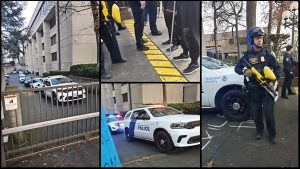Councilor Evans stands up for e-commerce distribution center
7 min read
Presenter: One city councilor stands up to support an Amazon megawarehouse for Northwest Eugene. In a phone interview Nov. 17, Councilor Greg Evans:
Councilor Greg Evans: I’m a supporter of economic development. It’s not like we have a whole lot of people knocking down our door to get in. We need the jobs and we need the property tax revenues that this facility will bring to the community.
[00:00:27] Over the last couple of years, a lot of money has dried up for our nonprofits who are providing services to the homeless and to other folks in the community that need it.
[00:00:39] And we have an imbalance of nonprofits and other people who are not paying into the property tax pool, our main source of income to support schools, support city government, county government, you know, a lot of the nonprofits out there that are delivering service on behalf of the county.
[00:01:03] We need to have tax revenue and, you know, that’s what it’s zoned for. Some people need to understand that, since the decline of the timber industry, we don’t have many other industries to pivot to that are going to provide jobs and provide tax revenues that we currently don’t have.
[00:01:28] I’ve got a school district in my ward, Bethel School District, and they’re continually struggling for money. Enrollment is down. That means that their share from the state is down.
[00:01:41] We’re going to have more challenges and people on the streets, in the homeless sector, as well as those people who are taking advantage of homeless people by, you know, integrating their nefarious purposes into that community.
[00:01:58] We have got to do some serious economic development that involves the private sector. . To attract and retain the businesses that are going to be paying taxes, i’m supportive of that. I’m in favor of that., Maybe some other people might run from it, but I’m not going to run from it.
[00:02:16] And know I’m going to catch hell behind that, but, you know, I’m trying to, speak to the broader issues that we have in this community. Not just Eugene, but Eugene Springfield, the whole region. We’re not Portland, you know, we don’t have the diversity in industry or incomes that you do up north.
[00:02:39] Our largest employers are University of Oregon, LCC, two out of the three of those are public entities.
[00:02:50] You know, none of us can, can take much more of this. I mean, we have got to get some relief. We can’t just continue to raise taxes with cost of living continues to go up and no end in sight for inflation.
[00:03:04] You know, Amazon may not be the greatest employer in the world, but you can say that about a whole lot of employers, both public sector and private sector.
[00:03:15] It’s like your old basketball: ‘Survive and advance.’ That’s where we are right now. We’re either going to survive and advance or we’re not, and we’re going to be another community that continues to struggle with finances and everything else. I mean, that’s what the new city manager’s going to have to face. That’s what the new EWEB director’s going to have to face. That’s what a lot of people are going to have to face that are walking into, quite frankly, some untenable situations.
[00:03:50] And not everybody sees that, because, you know, not everybody’s tuned into City Council or the county commissioners. But there comes a point when you have to face what the reality is, what the facts are.
[00:04:05] And, you know, how do you raise a family in this community? I mean, it’s not like it was when I came here 40 years ago, okay.
[00:04:14] Nationwide, and particularly in Oregon, we’re under pressure. We’ve only got two legs of the tax stool. We’ve got income tax, which is basically reserved off for other things. And then you’ve got property tax and everything’s got to come out of the property tax pool.
[00:04:35] I mean, there are people around here who just hate the business community for being the business community. But you know, if there weren’t people out there that were running restaurants, that were paying servers, that were paying people to be able to work in these industries, you know?
[00:04:57] I’m sorry, but not everybody can work at the University of Oregon or for the city, or for the county, or for any of the nonprofits, St. Vinnie’s or anybody else. Somebody’s got to pay taxes. Somebody has to pay taxes.
[00:05:15] And that’s what it boils down to, if this segment of the economy has any chance of surviving, I’m talking about K-12 schools. I’m talking about the community college. I’m talking about the university. Everybody’s looking at different and new models, and that’s what we have to look at. We cannot be stuck in the past. We can’t even be stuck in the present ’cause the present is moving to the future very rapidly.
[00:05:47] If a company comes here and they go through the proper processes and protocols, then we really don’t have anything to say about that. As city councilors, we are policy makers, we’re not practitioners.
To my knowledge there are no incentives, no tax breaks. They haven’t applied for anything that I know of.
[00:06:13] So, I mean, if you’re going to pay full freight, and you’re going to add jobs and you’re coming in an industrial area where your usage is not nearly what it is zoned for, let’s see what we can do to work it out within the context of what we are trying to do in terms of our environment and climate resiliency. We’ve got to put that first and foremost.
[00:06:40] But beyond that, we need jobs, we need income, we need tax revenue, and we need to be able to build up that corridor between OSU and U of O for further economic development. We’ve got to take advantage of the Highway 99 corridor for housing, for employment, for tax revenue, all of that. And we’re not taking advantage of it.
[00:07:13] We have had an RFP for a hotel at the airport that has gone unresponded-to for the last 10 years. Why? Because nobody wants to build hotels where there’s nothing there for them to go to.
[00:07:30] I’m an alternate on the Travel Lane County board. So I go to the meetings and the same message is coming out. We don’t have enough hotel rooms. Now, you would think that’s not the case with the number of hotels that have been built around here in the last seven or eight years. But we still don’t have enough hotel rooms.
[00:07:51] We don’t have enough hotel rooms. We don’t have enough short-term rentals for people who are living here going from paycheck to paycheck, trying to make sure they got food in the refrigerator and something to cook on the stove. You know, not everybody is well off and doing well. This is the reality of what most of our community is facing.
[00:08:16] The government safety net is gone. It is really gone and if we don’t realize that sooner than later, that big hole that’s in the safety net, it’s going to get larger and larger, and people are going to continue to fall through that net.
[00:08:33] This is what we mean when we see people on the street in tents and other things, because they have no other places to go.
[00:08:43] And I’m not saying Amazon doesn’t have their problems. They do. They’ve been noted to being not the best employers in the world. But I can point out to any number of employers, in this state or in this region that have sketchy track records with their employees. You can find that just about anywhere.
[00:09:04] And by the same token, you know, if a company comes here and they check all the boxes and they’re not stopped at LRAPA, they’re not stopped at DEQ, they’re not stopped at EPA and others, if they’re adhering to the statutory regulations, we don’t have really an argument to make on this.
[00:09:26] Tell them no ’cause you don’t like ’em? If you don’t like them, stop buying from Amazon. There you go. I mean, look at what has happened to Target.
[00:09:37] This is something that’s going to benefit my ward, my community, it will benefit all of us in the city, tell you the truth. But, I fully expect, you know, to be roasted over the coals about this, but I just got to call it the way it is that I’m seeing it.
[00:09:55] And, you know, I’ve been on Council for 12 years and we’re entering probably one of the most difficult five-to-six year periods over the arc of the next half-decade that we’ve ever seen. And that is true not just for Eugene, Springfield, and Lane County, but Oregon itself, and across the country.
[00:10:22] And I’m going to continue to advocate for my ward, for Bethel and for the people over here because our situation is getting worse by the day.
[00:10:34] Presenter: Councilor Greg Evans makes the case for economic development in Northwest Eugene.




